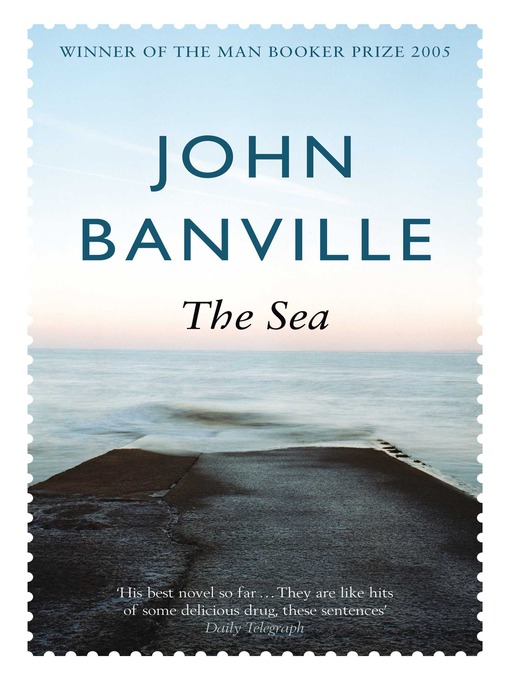Book review Tuesday: The Sea, by John Banville
I’ve been absolutely devouring books lately, like a starving person who can only take in nutrition through the eyes. That’s a thing, right? One of the things that I love most about my new life as a writer is how much I get to read and consider it “work.” I’ve learned that when left to my own devices, I’ll read a book every day or two, or sometimes two or three books at a time, and I just can’t get enough. Substitute the word “read” for “inject” and “book” for “vial of heroin” and one might think I have a problem.
Anyway, I’ve been getting a ton of my recommendations from the Man Booker Prize. In case you’ve never heard of it, the Man Booker Prize is given out each year to the best novel written by someone from the UK, the Commonwealth, or the Republic of Ireland. Their website helpfully lists all of the winners of the Prize as well as the books that were short-listed and long-listed for every year since 1969. For a book addict, the Man Booker Prize website is a dangerous website indeed.
I’ve downloaded and read quite a few of the Man Booker Prize winners and short-listers now, from various years. One that I recently finished is The Sea, by Irish author John Banville, which won the Prize in 2005.
The story is narrated by a man (Max) whose wife has recently died of cancer. While revisiting the trauma of her illness and death, Max also looks back on a certain childhood summer at the seaside when he became acquainted with a family, the Graces, who rented a house in the same resort town where he stayed with his family. As an adult, he’s so hung up on the events of this particular summer that he moves back to that resort town, Ballyless, and takes a room in the house where the Graces used to stay, which has since been converted into a rooming house. The book flashes between Max’s fresher recollections of his wife’s death and their life together and his old memories of the summer he spent with the Graces, a family he found fascinating. However, as the novel progresses, we learn that something terrible happened that summer at the seaside, and that Max is still trying to come to terms with it.
The Sea was not an entirely satisfying read for me. Some of the themes in the book seemed overly familiar, even a bit hackneyed, to me. For example, the Graces are a family of a mother, father, fraternal twin children (one of whom, the boy, is mute and has webbed feet), and a governess. I felt that Banville didn’t have any particularly new insights about the mysteriousness of twins, and his heavy-handed hints that the twins, Chloe and Myles, may have been sexually experimenting with one another seemed unnecessary. Plus, I think Donna Tartt and George R.R. Martin have pretty much cornered the market on blonde fraternal twins having sex. Maybe that’s unfair. But there are only so many times we can drag out that trope before it gets a bit stale. Some of the other themes in the book (watching a loved one die of cancer, first love, the perils of aging) also struck me as rather well worn.
I also felt that Banville failed to adequately build suspense for the final, terrible event that occurs at Ballyless. The foreshadowing was clouded with too much exposition about the narrator’s fascination with Mrs. Grace, the twins’ mother, his contemporary observations about his adult daughter, and his myriad complaints about aging. I understand that these layers are what add to the complexity of the book, but I found myself skimming whole paragraphs just to get to the meat of the story.
However, the novel is very well written, and contains some very insightful observations about life, particularly about the differences between adolescence and adulthood. This was one of my favorites, describing how Max felt after his first kiss with Chloe:
Happiness was different in childhood. It was so much then a matter simply of accumulation, of taking things – new experiences, new emotions – and applying them like so many polished tiles to what would someday be the marvelously finished pavilion of the self. And incredulity, that too was a large part of being happy, I mean that euphoric inability fully to believe one’s simple luck. There I was, suddenly, with a girl in my arms, figuratively, at least, doing the things that grown-ups did, holding her hand, and kissing her in the dark, and, when the picture had ended, standing aside, clearing my throat in grave politeness, to allow her to pass ahead of me under the heavy curtain and through the doorway out into the rain-washed sunlight of the summer evening. I was myself and at the same time someone else, someone completely other, completely new. As I walked behind her amid the trudging crowd in the direction of the Strand Café I touched a fingertip to my lips, the lips that had kissed hers, half expecting to find them changed in some infinitely subtle but momentous way.
I love that observation about collecting experiences in adolescence and stacking them up to create a vision of yourself. So perfect.
In all, I enjoyed Banville’s evocative writing, but I felt a bit let down by the psychodrama aspects of the plot. Maybe the synopses I read promised more than they could deliver in terms of the “dark,” mysterious nature of the plot. Luckily, the book is a rather quick read (only 198 pages, according to my Kindle), so it doesn’t require a huge time commitment to get through, so why not give it a try?
